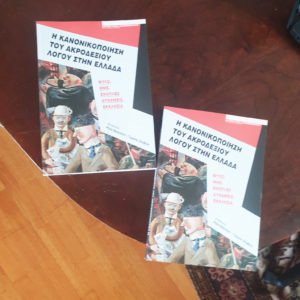The volume addresses the extremely critical issue of the normalization of the Far Right discourse by official institutions of the Greek state and by civil society. The chapters were prepared by a young team of researchers under the leadership of Dr Rosa Vasilaki, and they are graduates from various Greek universities with field expertise on issues related to racism and extremist discourse.

Speakers at the event included Dimitris Christopoulos, Nikos Vafeas, Olga Lafazani, Kleoniki Alexopoulou and Despina Lalaki, with the discussion moderated by Anna Stamou.
The volume will soon be available online for free download.
Dissensus is a research project led by Dr Rosa Vasilaki for the sociological and anthropological study of the rise of hate rhetoric and ideologies of discrimination in Athens, Greece.
To date, the sharp rise and popularity of political formations advocating hate, discrimination and violence has been studied mostly in terms of ideological analysis or electoral results. Dissensus, however, focuses on the role of institutions, such as the armed forces, the media, the Church, as well the discourse of the everyday people participating in these institutions. We also look at the multiple ways gender—and perceptions of masculinity and femininity—are instrumentalized to disseminate and normalize discriminatory and exclusionary views.
Our current research project, “Socio-political transformations and hate rhetoric in Greece” seeks to produce a nuanced understanding of the processes which have led to the recent rise in hate rhetoric and a propensity for extreme discriminatory views.
For this purpose, the study used a mixed methods approach: a combination of in-depth interviews, questionnaires, and focus groups. Our methodological choices were shaped by our commitment to investigating people’s popular perceptions and interpretations of their social world and the complex motivations behind the endorsement of hate or fear in organized, political and ideological forms.
Understanding how people cope with economic adversity, cultural anxiety, fear of the unknown and structural inequalities by embracing reassuring yet destructive ideologies will allow us to formulate policies that build resilient, inclusive and democratic societies.











